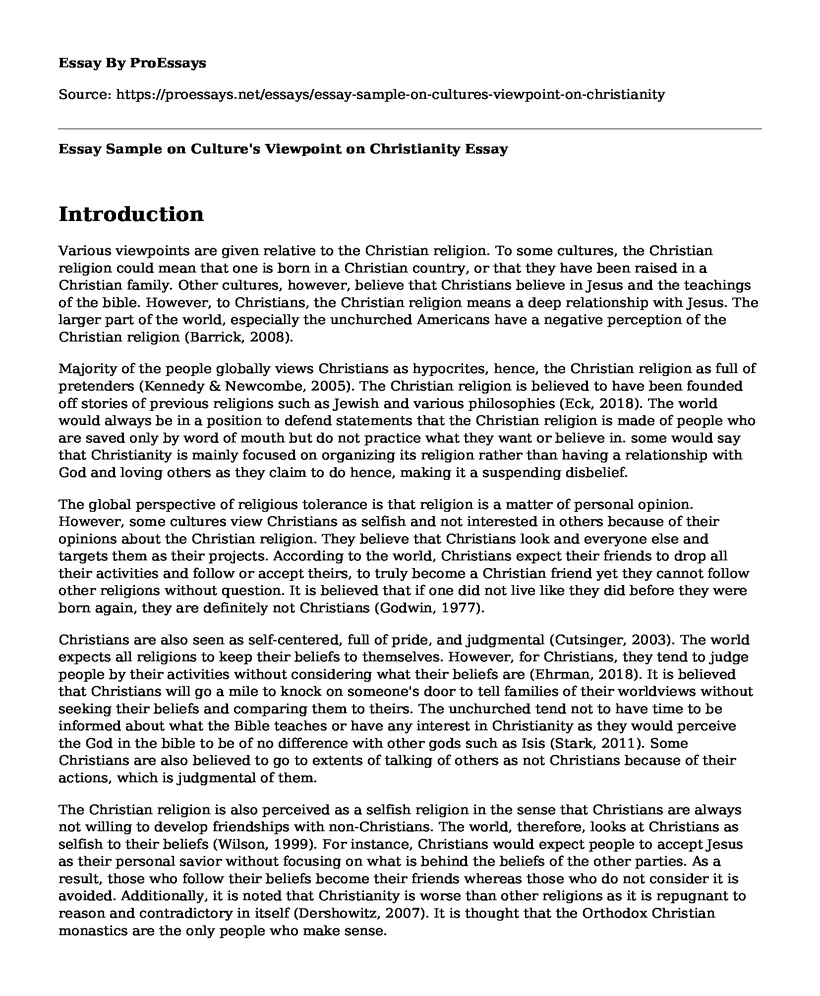Introduction
Various viewpoints are given relative to the Christian religion. To some cultures, the Christian religion could mean that one is born in a Christian country, or that they have been raised in a Christian family. Other cultures, however, believe that Christians believe in Jesus and the teachings of the bible. However, to Christians, the Christian religion means a deep relationship with Jesus. The larger part of the world, especially the unchurched Americans have a negative perception of the Christian religion (Barrick, 2008).
Majority of the people globally views Christians as hypocrites, hence, the Christian religion as full of pretenders (Kennedy & Newcombe, 2005). The Christian religion is believed to have been founded off stories of previous religions such as Jewish and various philosophies (Eck, 2018). The world would always be in a position to defend statements that the Christian religion is made of people who are saved only by word of mouth but do not practice what they want or believe in. some would say that Christianity is mainly focused on organizing its religion rather than having a relationship with God and loving others as they claim to do hence, making it a suspending disbelief.
The global perspective of religious tolerance is that religion is a matter of personal opinion. However, some cultures view Christians as selfish and not interested in others because of their opinions about the Christian religion. They believe that Christians look and everyone else and targets them as their projects. According to the world, Christians expect their friends to drop all their activities and follow or accept theirs, to truly become a Christian friend yet they cannot follow other religions without question. It is believed that if one did not live like they did before they were born again, they are definitely not Christians (Godwin, 1977).
Christians are also seen as self-centered, full of pride, and judgmental (Cutsinger, 2003). The world expects all religions to keep their beliefs to themselves. However, for Christians, they tend to judge people by their activities without considering what their beliefs are (Ehrman, 2018). It is believed that Christians will go a mile to knock on someone's door to tell families of their worldviews without seeking their beliefs and comparing them to theirs. The unchurched tend not to have time to be informed about what the Bible teaches or have any interest in Christianity as they would perceive the God in the bible to be of no difference with other gods such as Isis (Stark, 2011). Some Christians are also believed to go to extents of talking of others as not Christians because of their actions, which is judgmental of them.
The Christian religion is also perceived as a selfish religion in the sense that Christians are always not willing to develop friendships with non-Christians. The world, therefore, looks at Christians as selfish to their beliefs (Wilson, 1999). For instance, Christians would expect people to accept Jesus as their personal savior without focusing on what is behind the beliefs of the other parties. As a result, those who follow their beliefs become their friends whereas those who do not consider it is avoided. Additionally, it is noted that Christianity is worse than other religions as it is repugnant to reason and contradictory in itself (Dershowitz, 2007). It is thought that the Orthodox Christian monastics are the only people who make sense.
Conclusion
The world's perception of the Christian religion is more of negative-focused than being positive. Many cultures would underpin Christianity based on the definition of Christians as hypocrites, a religion that focuses on public opinion, made of self-centered, selfish, and ill people which are negative views as opposed to other religions.
References
Barrick, A. (2008). How Do Unchurched Americans View Christianity? Retrieved from https://www.christianpost.com/news/how-do-unchurched-americans-view-christianity-30793/
Cutsinger, J. S. (2003). Not of this world: A treasury of Christian mysticism. Bloomington: IN World Wisdom.
Dershowitz, A. (2007). Blasphemy: How the Religious Right is Hijacking the Declaration of Independence. New Jersey: John Wiley & Sons
Eck, D. L. (2018). A new religious America: How a "Christian country" has now become the world's most religiously diverse nation. New York: Harper One.
Ehrman, B. D. (2018). Triumph of Christianity: How a forbidden religion swept the world. S.l: Simon & Schuster.
Godwin, J. C. (1977). What it means to be born again. Nashville: Broadman Press.
Kennedy, D. J., & Newcombe, J. (2005). Lord of all: Developing a Christian world-and-life view. Wheaton, IL: Crossway Books.
Stark, R. (2011). The triumph of Christianity: How the Jesus movement became the world's largest religion. New York: Harper One.
Wilson, B. C. (1999). Christianity. London: Rutledge.
Cite this page
Essay Sample on Culture's Viewpoint on Christianity. (2022, Oct 28). Retrieved from https://proessays.net/essays/essay-sample-on-cultures-viewpoint-on-christianity
If you are the original author of this essay and no longer wish to have it published on the ProEssays website, please click below to request its removal:
- Deuteronomy 30:11-14
- Jesus Christ
- Ten Things About Prophet Muhammad - Essay Sample
- The Mobile Phone Bible Is Now Replacing the Book Bible Paper Example
- Essay Sample on the War Between the Evil and the Divine Within: Exploring Truth, Sight, and Vision
- Devout Christian's Unexpected Revelation: Bible Study at 12 - Essay Sample
- Essay Example on The Path of Buddhahood: Practical Teachings and Spiritual Development







